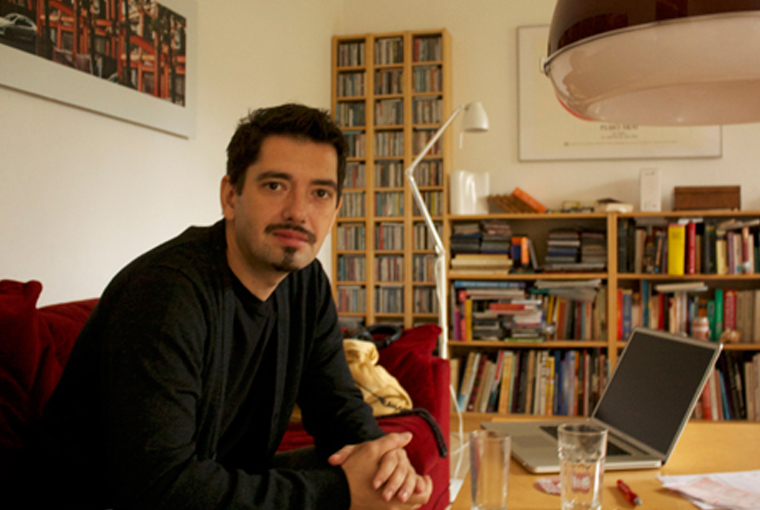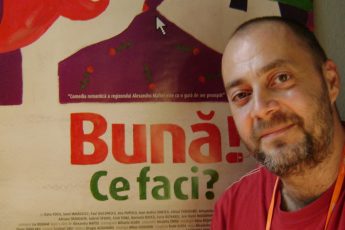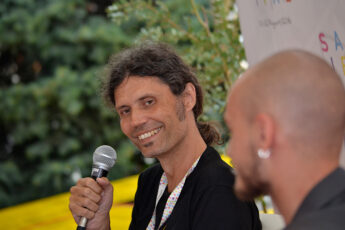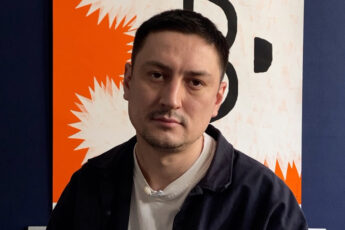
We met Munich-based Romanian filmmaker Şerban Oliver Tătaru to speak to him about his documentary “Anatomy of a Departure,” in which he retraces his family’s emigration to Germany. Tătaru speaks about the making of the film, working in Germany, and the Romanian New Wave.
Your film mostly speaks about going away – what was it like to return to Romania for your film?
Well, returning for the film had already been anticipated by our return four months after the revolution. That’s when we faced alienation for the first time. I returned to a different country – due to the newly-gained independence, people began looking at life in a completely different way. Life wasn’t about surviving anymore or being glad for what one had, but about having as much as possible – a lot of money and material possessions. I returned to a country which I didn’t recognize: this is what the ending of the film is about.
The project was motivated by my desire to find places that are still the same as before, which is why I retreated to roof tops. When I was a kid, me and my friend would smoke on our roof top once my father would leave home – we were 14 or 15 then -, so the roof top was something of an island, there it was just us and the cigarettes. My location scout in Romania helped me find places that fitted this theme. This is the tension in the film: I wish nothing had happened – not that I don’t wish that the revolution hadn’t happened – but for the purpose of memory.
But the way you describe it, one could see a material continuity in people’s priorities: people always tried to get more money and more possessions, only that after 1989 there seemed to be more opportunities to get rich.
Well, you have to differentiate between social classes. There were always classes which tried to have more and who wished for cars, but the “ordinary” people and the intelligentsia – which is the class in which I grew up -, weren’t dominated by the desire of becoming wealthier. The priority was to be oneself and survive – make the best out of it. After 1989, friends around us suddenly started thinking about where they could get “nice things,” it was a completely different feeling.
The theme of your film is very similar to German stories of families torn apart by the Berlin Wall. Did you try to distance yourself from such narratives, or was this reference irrelevant for your project?
I didn’t really think about such an association. Evidently, there is a connection to the German East-West division and there were some people who recommended to search for parallels to GDR to please German viewers, but I wasn’t really going for this.
Do you think it’s justified that your film was screening as a Romanian contribution at the film festival of Romanian film in Munich?
I think this is a very Romanian film. There were some people who criticized that I always show Ceaucescu and the pioneers etc. instead of going for some original material, but if you used something different it would be a wholly different story which would have to do less with our history. Besides, it wasn’t done for a Romanian audience only, and it’s good to have some contextualization for German viewers. I also realised how many older people came to the screenings, viewers who can relate to the story. Nearly all of the Transylvanian Saxons are now here, and the question of going away is one that they all ask themselves.
Q&As and feedback from viewers proved that many Romanians – young and old – really care about this story. A lot of young people told me they were happy I showed them the way life was, not just demonisation. I think this is a problem in West German films about East Germany too. Many directors seem to go for what audiences and festivals ask for, not for what everyday life might really have been like. When you watch films set in the Eastern bloc, you get the idea that this was a dark time when everyone was unhappy.
Do you think “Why go away” is not a rhetorical question for Romanian viewers, then? Would a Romanian intellectual answer such a question?
I think there were people who didn’t want to leave just as today there are young people who don’t want to leave. Most of them may, but there is also a trend of saying “I will stay because I can change something here”. I think not asking yourself this question because life in your country is hard is near-sighted.
But in countries of the Eastern bloc, many people didn’t even have the hope of being able to change something…
Sure, and Romania was much worse than a lot of countries in Eastern Europe. But still I wouldn’t say that most people wanted to leave. And there were counterarguments: people were saying that Germans were “cold,” you couldn’t return to see your family or your friends – that would have been an unswallowable prize for many…
Was there a moment when your family was disillusioned about Germany? There’s this scene when your father says that it only occurred to him in Germany how people treated you as a foreigner.
My father didn’t decide to Germany because he thought it was idyllic, but simply because he couldn’t stand the difficulty, the restrictedness, the sad atmosphere. Many people in Eastern Europe still think life in Germany is perfect. When I travel there and tell them that I live in Munich, they immediately change their attitude towards me – suddenly it’s clear why you’re happy, optimistic, dressed well etc. But of course, there are also people who realise after some time that they would be happier at home, and many return, even once they’ve already retired. I think home as a place of happiness shouldn’t be underestimated.
And in your case, that would be Germany or Romania?
It’s really difficult to destroy “home”, but I suppose my parents have succeeded in doing it – they’ve settled here, even if they enjoy spending time in Romania. I’m in Germany, too, now, but it’s difficult for me to say where my home is.
But your film was no search for home?
No. I find such films a little hypocritical – I think everybody knows where their home is. Pretending as if you looked for it might be amusing for the audience, but I don’t think it’s really insightful from the perspective of a filmmaker.
Isn’t that always a problem – where is the line between narrative interest and genuine interest? Was your film a process of facing leaving, or was the conflict recast for the audience?
This might be hard to believe, but it really was the first time we dealt with this question so explicitly. I tried to make the film as personal as possible. You can tell that my parents find some of the questions I ask stupid, because they thought “Why now?”. It appeared as if we had silently agreed we wouldn’t speak about these matters, and here I was making a film about them. I think it’s interesting how there are things that are left untold between people – even between parents and their children. In fact, the drama of the film grows out of the relationship between me and my parents.
I categorically did not want to stage this film. I recorded the voice-over at my place during evenings and nights and then handed them to my editor. It may come off as slightly poetic, but I did my best to keep the text as real and personal as possible.
But you say things differently in front of a camera then when you’re alone…
Of course, but it’s still me. I said it as I felt it, and since it is my film this is justified. I can’t censor myself – that’s when the film would become artifical.
Did you have the impression that your parents enjoyed going back in time?
No, not at all. They didn’t enjoy the making of this film and we hardly speak of it even today. They think it’s partially untrue what I say in it, but don’t want to bother talking about it because it’s my film and because the discussion went so in-depth.
Do you think it’s problematic that RNW films want to present an objective “reality” where your film speaks about the subjectivity of remembering?
No, I think these are genuine bits from Romania’s former collective memory. That is really how people remember that time. I know the films don’t do that well at box offices because they’re long and it’s all dialogues. Many people don’t want to see these films because they think they already know that reality. I don’t want to belittle these films, but the approach is straightforward: you take an anecdote or story from Romania’s past and film it through this Romanian reality lens. I think it’s a good wave that Romanian filmmakers are riding on, also because it’s easy to make them: you focus on actors and dialogues, which is convenient for a country which doesn’t invest much money into cinema.
Do you think it’s helpful to have a national identity in art? It seems that at the moment Romania has a much stronger one than Germany, even if most RNW directors would probably deny this.
I think it’s to good to have a national identity in cinema and I don’t understand why Romanian filmmakers would deny a national identity. If you wanted to make a “Romanian” vs. a German film, it’d be much easier to go about making the former than the latter. In Germany’s case, you’d start by bringing in a series of editors and bureaucrats to see what they say, and then you could try Constantin Film so that maybe your project can be succesful. In Romania, it’s all about language, games, the camera that aspires to be unimpressive – no “large cinema”. I think that Romanian filmmakers know what they’re doing, and that they’re doing it consciously. Besides, in Germany there seems to be a false consensus that there are objectively right or rong ways to approach cinema (hence the bureaucracy), whereas Romanian filmmakers usually just try to show you the way they make films and how great they are – there’s more Ego involved.
It would be nice to make some documentaries in Romania. There are certain topics which are probably easier to address when you go there with a foreign eye, which I have, although I also have some of that inside perspective. I think I could make films in Romania that people would care about. It’s interesting that if you compare uncommercial documentaries from Germany and Romania, Germany probably has the better films.
Why do you think that there are so few renowned Romanian documentaries if the RNW-premise is inherently realistic?
That may precisely be the reason, that the naturalistic Romanian features seem like documentaries with actors. So the question becomes, “what could you show differently, what more is there to say?” There is so much reality in Romanian fiction films that they seem to take the wind out of the sails of documentary filmmaking. I’m not sure whether that’s all that bad.
But do we even need documentaries in Romania, then?
Well, a difference remains. I think that regardless of its quality fiction film is an entertaining discipline, so that real emotions communicated through a documentary have a completely different effect on the viewer. It may simply be more convenient and efficient to tell certain stories from Ceaucescu’s time through fiction films, while in other cases, the appeal of documentaries remains.
Thank you for the interview.




Leave a Comment